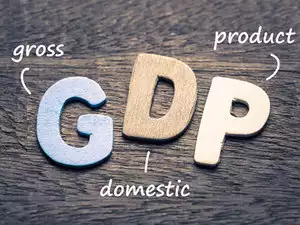Nigeria has been trending in the news after releasing its 2nd quarter of 2018 (Q2-2018) Gross Domestic Product (GDP) results. As reporters and analysts continue to discuss expectations, for the third and fourth quarter of the year, as well as corresponding impacts on the economy and its various sectors, I thought it a good opportunity to make a clarification about the concept of GDP. A number of people (myself included) have made a fundamental mistake when it comes to GDP. So the purpose of this post is to make a clarification about GDP.
GDP is the total value of goods and services produced in an economy within a year. It is expressed in nominal terms, and this is partly where the confusion comes from. GDP helps us determine if the economy is growing compared to the past. Under normal circumstances, a rise in GDP corresponds to a rise in the standard of living of citizens. This increase leads to higher spending on various goods and services within the economy.
When GDP is falling it means that the economy is losing ground, and this puts governments, economists and investors on alert. Two consecutive quarters of a decline is referred to as a recession. The goal of every government is to increase the GDP of an economy, thereby creating favourable conditions for its citizens. This brings us to the one thing you must know about GDP.
“GDP measures the value of production within an economy. It is not the same as how much money an economy generated in revenue terms within a given period. It also differs from the increase and decrease in the price of goods and services within an economy (inflation) ”
The main point here is to realise that GDP is a measurement of production (output), and this measurement of production (value) has nothing to do with price. Because it is estimated in currency terms, people confuse GDP for the revenue of the aggregate economy. Let’s look at Nigeria’s most recent GDP performance to illustrate this point. Currently, in nominal terms, Nigeria’s GDP stands at N30.69tn in Q2-2018. Broadly speaking, growth in Q2-2018 was driven by developments in the non-oil sector as the services sector recorded its strongest positive growth since 2016.
However, Nigeria’s GDP growth rate fell to 1.5% in Q2-2018 from 1.95% in the previous quarter. This means a slower growth rate for two consecutive quarters as a result of lower oil sector GDP oil. ( oil GDP contracted to -3.95% from 14.77% in the previous quarter).
This translates to Nigeria’s broad economy coming out of the recession at a slower pace than we saw in previous quarters. This could mean that foreign portfolio investors would look at this figures and be wary of investing in the market. Infact what it means is that more foreign players may continue to exit the market in search of better yields for their capital, most likely in the United States. This is exactly the case with South Africa, which is now having its first recession in 9 years (real gross domestic product contracted by 0.7% in the second quarter of 2018. This follows a revised fall of 2.6% in the first quarter of the year)
So the main point of this is to realise that GDP is a measurement of production output, and is not about price. If you want to know Nigeria’s revenue generated within a given period, this is provided in the Federation Account Allocation Committee (FAAC) monthly reports that shows how much the three tiers of government received in revenue terms (provided by The Nigerian Bureau of Statistics (NBS) http://www.nigerianstat.gov.ng )
NBS also provides inflation information. Inflation is different from GDP, but it’s also a key economic indicator.This has more to do with the changes in prices than GDP does. Inflation informs at what rate the prices of goods and services are changing within an economy, thereby allowing us to make better economic decisions. So GDP, inflation and government revenue are vital indicators as to how the economy is performing, but they are fundamentally different and should not be confused.
Now go forth and have conversations about the economy in full confidence that you do know what you are talking about when it comes to GDP.
By Akinfemi Onadele.


